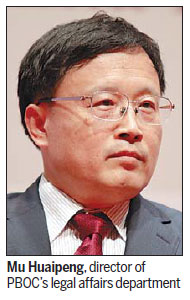Internet banking a game changer
Updated: 2014-11-07 11:04
By Hu Haiyan and Andrew Moody(China Daily Europe)
|
|||||||||||

The Internet is transforming the way people do banking in China, according to a senior official from the People's Bank of China, the country's central bank.
Mu Huaipeng, director of PBOC's legal affairs department, told the 8th Annual China Bankers Forum that it was revolutionizing the way people do banking.
"The Internet has changed the way traditional financial institutions operate in terms of their interaction with customers," he says.
"In the past, customers provided information over bank counters but now they are now used to doing this over the Internet."
Online banking transactions in China hit 382.7 trillion yuan in the second quarter of this year, a 27.8 percent jump compared with the same period last year, according to China market intelligence group Enfodesk.com.
Although the big players are the major banks such as Industrial and Commercial Bank of China with a 34 percent share and Construction Bank of China with 15.3 percent, there is increasing competition from non-bank entrants.
These include Internet giants Baidu, Alibaba and Tencent, which are challenging the traditional banks with innovative online and mobile banking products.
Mu said the Internet companies are a real challenge to established players, particularly Tencent, which has taken advantage of the payment tool it has developed for its instant messaging platform WeChat.
"Tencent has won a number of clients from its huge customer base. It is harder for traditional banks to promote new products and increase their own customer base."
Bank of China was the first to pioneer Internet banking in China in 1996. This was seven years after HSBC became the first Western bank to launch an Internet bank when it set up First Direct in the UK in 1989.
China Merchants Bank was the first to launch an Internet payment system in 1997, after which Internet banking and telephone banking spread rapidly throughout the country.
Some 1.63 trillion yuan worth of transaction volume were made using third party Internet payments tools in the first quarter of the year, according to Enfodesk.com, a 110.5 percent increase on the previous quarter, a figure inflated by spending before the Chinese New Year holiday. Just over three quarters (77.8 percent) were made using Alibaba's Alipay payment service.
The Internet has also provided a platform for a massive expansion of P2P, or peer to peer lending.
This has led to a major increase in lending to SMEs with wealthy individuals seeking out companies to lend to on such platforms.
The company that has led the field in this area has been Credit Ease, a Beijing-based company launched eight year ago. It is now twice the size of its US equivalent, Lending Club.
Tang Ning, the company's founder and CEO, says the Internet is now leading the market.
"Technology has added wings to the finance sector. It has made the impossible become possible. Big data can now be used to check the authenticity of any documentation to solve fraud issues that were hard for us to solve before," he says.
Steve Owen, executive vice-president for global sales and marketing for NXP Semiconductor, a leading Eindhoven-based semiconductor company that provides banking technology solutions, says Internet banks are a major challenge to the established players not just in China but globally.
"A big challenge for the US banks is that they can no longer guarantee that it would be more profitable to conduct banking on the Internet than traditionally," he says.
"Now clients want to use smartphones and the Internet for banking. If you as a bank don't meet this challenge, you cannot catch up with changes in the market."
Albert Chan, leader of financial client services for international management consultants Accenture Greater China, says Internet banks are very good at meeting customers' needs.
"Although traditional banks already possess the technologies, they haven't formed a mode of thinking to properly provide services according to customer needs," he says.
Mu at the PBOC insists there is plenty of scope for collaboration between the established banks and the new players since in many cases they offer different services.
"The traditional financial institutions' Internet businesses and those of the Internet banks are highly complementary to each other and together will make a complete financial system," he says.
(China Daily European Weekly 11/07/2014 page7)
Today's Top News
China, Russia agree on military coop projects
Faster pace set in bid to protect Internet
US, France cite concerns about Iran nuclear talks
China donates $2 million to WHO to combat Ebola
Policy banks to lead Silk Road infrastructure fund
Ukraine's rebel leader sworn in
World Cup-winning captain succeeds coach at Evergrande
Ukraine rebels announce results of 'elections'
Hot Topics
Lunar probe , China growth forecasts, Emission rules get tougher, China seen through 'colored lens', International board,
Editor's Picks

|

|

|

|

|

|





